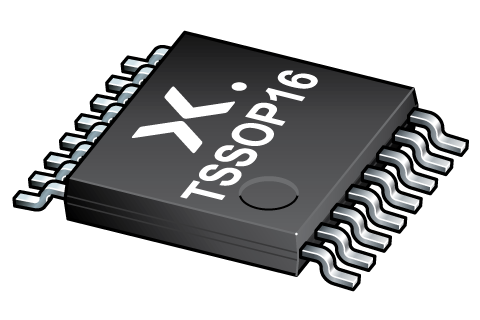Orderable parts
| Type number | Orderable part number | Ordering code (12NC) | Package | Buy from distributors |
|---|---|---|---|---|
| 74CB3Q3253PW | 74CB3Q3253PWJ | 935339209118 | SOT403-1 | Order product |

Register once, drag and drop ECAD models into your CAD tool and speed up your design.
Click here for more informationDual 1-of-4 FET multiplexer/demultiplexer with charge pump
The 74CB3Q3253 is a dual high-bandwidth single-pole, quad-throw FET bus switch. Each switch features a select input (Sn) and an output enable input (nOE). The switch is disabled when the nOE input is HIGH. An internal charge-pump increases the gate voltage of the NMOS pass transistor. The result is improved RON and RON(flat) performance and the ability to switch 5 V signals when VCC = 3.3 V.
Wide supply voltage range from 2.3 V to 3.6 V
Overvoltage switching on switch ports:
0 V to 5 V switching with VCC = 2.5 V
0 V to 5 V switching with VCC = 3.3 V
Switch voltage accepts signals up to 5.5 V
4 Ω (typical) ON resistance
3.5 pF (typical) OFF-state capacitance
High bandwidth 0.5 GHz (maximum)
Low input/output capacitance minimizes loading and signal distortion
Fast switching frequency fmax = 20 MHz (maximum)
Low power consumption ICC = 0.4 mA (typical)
Control inputs can be driven by TTL or 5 V/3.3 V CMOS outputs
IOFF supports partial power-down mode operation
Latch-up performance exceeds 100 mA per JESD 78E Class II Level A
ESD protection:
HBM: ANSI/ESDA/JEDEC JS-001 class 2 exceeds 2000 V
CDM: ANSI/ESDA/JEDEC JS-002 class C3 exceeds 1000 V
Specified from -40 °C to +85 °C
Communication infrastructure
Bus isolation
Memory interleaving
Sensor multiplexing
| Type number | VCC (V) | VPASS (V) | Logic switching levels | RON (Ω) | f(-3dB) (MHz) | Nr of bits | tpd (ns) | Power dissipation considerations | Tamb (°C) | Rth(j-a) (K/W) | Ψth(j-top) (K/W) | Rth(j-c) (K/W) | Package name |
|---|---|---|---|---|---|---|---|---|---|---|---|---|---|
| 74CB3Q3253PW | 2.3 - 3.6 | Vcc | CMOS/LVTTL | 4 | - | 2 | 0.2 | very low | -40~85 | 116 | 2.4 | 44.3 | TSSOP16 |
| Model Name | Description |
|---|---|
|
|
| Type number | Orderable part number, (Ordering code (12NC)) | Status | Marking | Package | Package information | Reflow-/Wave soldering | Packing |
|---|---|---|---|---|---|---|---|
| 74CB3Q3253PW | 74CB3Q3253PWJ (935339209118) |
Active | B3Q3253 |

TSSOP16 (SOT403-1) |
SOT403-1 |
SSOP-TSSOP-VSO-WAVE
|
SOT403-1_118 |
| Type number | Orderable part number | Chemical content | RoHS | RHF-indicator |
|---|---|---|---|---|
| 74CB3Q3253PW | 74CB3Q3253PWJ | 74CB3Q3253PW |
|
|
| File name | Title | Type | Date |
|---|---|---|---|
| 74CB3Q3253 | Dual 1-of-4 FET multiplexer/demultiplexer with charge pump | Data sheet | 2024-04-11 |
| AN90063 | Questions about package outline drawings | Application note | 2025-10-22 |
| SOT403-1 | 3D model for products with SOT403-1 package | Design support | 2020-01-22 |
| cb3q3253 | IBIS model of 74CB3Q3253 | IBIS model | 2017-08-24 |
| Nexperia_document_leaflet_CB3Q_switches_201803 | CB3Q Bus Switches | Leaflet | 2018-04-06 |
| Nexperia_package_poster | Nexperia package poster | Leaflet | 2020-05-15 |
| TSSOP16_SOT403-1_mk | plastic, thin shrink small outline package; 16 leads; 0.65 mm pitch; 5 mm x 4.4 mm x 1.1 mm body | Marcom graphics | 2017-01-28 |
| SOT403-1 | plastic, thin shrink small outline package; 16 leads; 5 mm x 4.4 mm x 1.2 mm body | Package information | 2023-11-08 |
| SOT403-1_118 | TSSOP16; Reel pack for SMD, 13"; Q1/T1 product orientation | Packing information | 2020-04-21 |
| 74CB3Q3253PW_Nexperia_Product_Reliability | 74CB3Q3253PW Nexperia Product Reliability | Quality document | 2025-03-20 |
| SSOP-TSSOP-VSO-WAVE | Footprint for wave soldering | Wave soldering | 2009-10-08 |
If you are in need of design/technical support, let us know and fill in the answer form we'll get back to you shortly.
The Nexperia Longevity Program is aimed to provide our customers information from time to time about the expected time that our products can be ordered. The NLP is reviewed and updated regularly by our Executive Management Team. View our longevity program here.
| Model Name | Description |
|---|---|
|
|
| Type number | Orderable part number | Ordering code (12NC) | Status | Packing | Packing Quantity | Buy online |
|---|---|---|---|---|---|---|
| 74CB3Q3253PW | 74CB3Q3253PWJ | 935339209118 | Active | SOT403-1_118 | 2,500 |
|
As a Nexperia customer you can order samples via our sales organization.
If you do not have a direct account with Nexperia our network of global and regional distributors is available and equipped to support you with Nexperia samples. Check out the list of official distributors.
The interactive datasheets are based on the Nexperia MOSFET precision electrothermal models. With our interactive datasheets you can simply specify your own conditions interactively. Start by changing the values of the conditions. You can do this by using the sliders in the condition fields. By dragging the sliders you will see how the MOSFET will perform at the new conditions set.